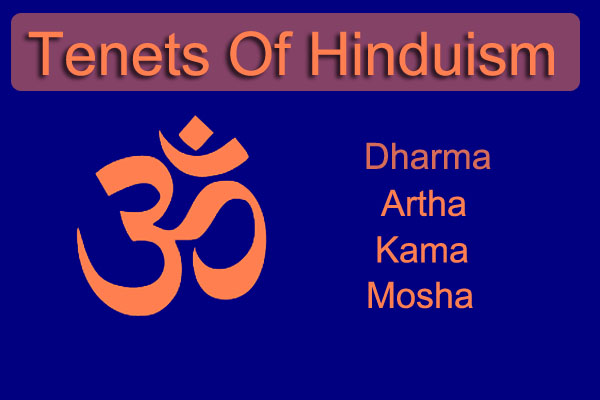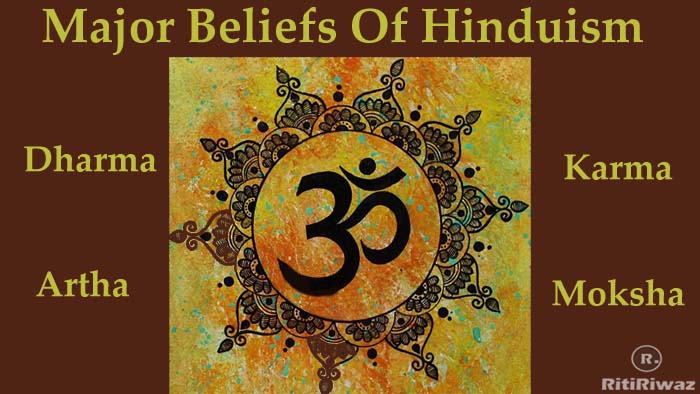Further a true person does not regret or brood over losses caused by speaking truth. As per the sacred scriptures of Hinduism.
 Hinduism And Buddhism Hinduism Buddhism Hinduism Reincarnation
Hinduism And Buddhism Hinduism Buddhism Hinduism Reincarnation
Though considered more ancient religion it follows advanced and foremost practices that are proven scientifically true.

What are the main beliefs of hinduism. Hinduism is not just a religion but it was a way of life. There is one supreme impersonal reality called Brahman. India is home to several religions but the most common is Hinduism at 80 of the population.
The six major schools of Hinduism hold this belief at different levels of literal adherence but uniting all of them is the belief that ones current situation has been brought about by previous actions and decisions and that future circumstance will be the natural outcome of the decisions and actions you make in this moment. It is the union of reason and intuition that cannot be defined but is only to be experienced. Hindus are mostly concerned about following certain principles described in Vedas.
The power upholds all parts of the universe but Hindus do not worship the concept. Another important belief in Hinduism relates to the notion of reincarnation also known as samsara a constant cycle of birth life death and rebirth. Hinduism is prevalent in India and is based on the Vedas which are four sacred texts.
Indias first major religion. Though many perceive Hinduism as a polytheistic religion its philosophy is much more nuanced. Brahman is the source of all things but is not a personal creator.
Not act fraudulently be dishonest or a liar in life. These deities are linked to universal and natural processes. A Summary of Some Beliefs in Hinduism Brahman.
Dharma - law obligation and duty Karma - governs what happens to peoples soul after death. Reincarnation means the soul or Atman takes a new body after death and it grows and matures and repeats this cycle until it attains Moksha. Dharma is the religious duty of people to follow the principals of the cosmic order including the rules that guide the morality of all human beings.
This is called Moksha. Brahman is Truth and Reality. Common to virtually all Hindus are certain beliefs including but not limited to the following.
Dharma Karma Artha and Moksha are the four major beliefs of Hinduism Other major beliefs of Hinduism are the concept of reincarnation and it is also the central belief in Hinduism. The other main Hinduism beliefs include soul Dashavataram belief in God etc. Multiple Gods - gods and goddesses represented Brahmans various powers and qualities.
Hindus believe in the divinity of the Vedas the worlds most ancient scripture and venerate the Agamas as equally revealed. Belief in soul Aatma All the Hindus believe that every living being has a soul Aatma and this soul is led by one superior soul known as Parmatma. Hinduism is the third-most widespread religion in the world after Islam and Christianity and it is thought to be the oldest religion in the world dating back at least 5000 years ago.
Animals soul is believed to be equivalent to the soul of a human being and Hindus believe that the main aim of a Hindus should be one of those souls that are with Parmatma. These primordial hymns are Gods word and the bedrock of Sanatana Dharma the eternal religion which has neither beginning nor end. Here are some of the key beliefs shared among Hindus.
Brahman - name of one supreme god. The very essence of the universe and the only Reality. As per Hinduism religion.
The major Hinduism beliefs consist of - 1. During this cycle a soul reincarnates in several forms and can become human animal or even a divine being. Hinduism is the self-generated religion and does not constrict under certain rules as commandments.
The form of a human being is not the ultimate essence of life. A belief in many gods which are seen as manifestations of a single unity. According to the Vedas Truth is One but the wise express it in a variety of ways.
One of the basic beliefs of Hinduism entails attaining moksha from the cycle of rebirth. All followers of orthodox Hinduism believe in a sole God a single reality that is simultaneously transcendent and immanent as much Creator as creation. Hindus believe in Brahman which refers to a power throughout the universe.
The basic beliefs of a religion are those that form the thoughts feelings actions and the entire attitude of its followers towards the world around them and their fellow men. It is the mainstay of the basic moral law of Hinduism. Hinduism is considered to be one of the most tolerant religions in the world.
Hinduism is not just a faith. Belief in continuity of life. A preference for one deity while not excluding or disbelieving others.
One should be truthful. Basic beliefs of Hinduism are reincarnation and Karma. Hindus pursue knowledge and understanding of the Truth.
Brahman is rather the divine essence of all that exists. People are rooted in Satya the greatest truth unity of all life. The three basic teachings of Hinduism are Dharma Karma and Moksha.
Core beliefs of Hinduism.
Those who worship Vishnu the preserver and Vishnus important incarnations Rama Krishna and. The power upholds all parts of the universe but Hindus do not worship the concept.
 Core Belief Of Hinduism Ritiriwaz
Core Belief Of Hinduism Ritiriwaz
The other main Hinduism beliefs include soul Dashavataram belief in God etc.

The beliefs of hinduism. Other major beliefs of Hinduism are the concept of reincarnation and it is also the central belief in Hinduism. The word Hindu is an exonym and while Hinduism has been called the oldest religion in the world many practitioners refer to their religion as Sanātana Dharma Sanskrit. The very essence of the universe and the only Reality.
It is not necessary to worship more than one deity rather permissible to worship one god as a favorite. Scholars do not typically define Hindusim in terms of common doctrine but rather by loosely shared rituals traditions and religious inclinations. Belief in continuity of life.
Hinduism does not have an official set of beliefs. Although the name Hinduism is relatively new having been coined by British writers in the first decades of the 19th century it refers to a rich cumulative tradition of texts and practices some of which date to the 2nd millennium bce or possibly earlier. The 10 disciplines in Hinduism include five political goals called Yamas or Great Vows and five personal goals called Niyamas.
This is called Moksha. Beyond both of these is the spirit or the spark of God within the soul. Reincarnation means the soul or Atman takes a new body after death and it grows and matures and repeats this cycle until it attains Moksha.
According to the Vedas Truth is One but the wise express it in a variety of ways. There is no formal creed one must accept to be Hindu. Evil and error are not ultimate.
These deities are linked to universal and natural processes. Core beliefs of Hinduism. Hinduism is an Indian religion and dharma or way of life.
It is the union of reason and intuition that cannot be defined but is only to be experienced. Common to virtually all Hindus are certain beliefs including but not limited to the following. Basic beliefs of Hinduism are reincarnation and Karma.
Hindus are often classified into three groups according to which form of Brahman they worship. How did Hinduism begin. The central beliefs of Hinduism around which rotates Hinduism religion.
A preference for one deity while not excluding or disbelieving others. Basic Beliefs The fundamental teaching of Hinduism or Vedanta is that a human beings basic nature is not confined to the body or the mind. A belief in the possibility of liberation and release moksha by which the endless cycle of birth death and rebirth samsara can be resolved Hinduism is bound to the hierarchical structure of the caste system a categorization of members of society into defined social classes.
A belief in many gods which are seen as manifestations of a single unity. Hindus in general believe that time is cyclical much like the four seasons and eternal rather than linear and bounded. Hinduism is not just a faith.
Brahman is Truth and Reality. Here are some of the key beliefs shared among Hindus. The 5 Great Vows Yamas are shared by many Indian philosophies.
Hindus believe in Brahman which refers to a power throughout the universe. Animals soul is believed to be equivalent to the soul of a human being and Hindus believe that the main aim of a Hindus should be one of those souls that are with Parmatma. Though many perceive Hinduism as a polytheistic religion its philosophy is much more nuanced.
Hinduism is the self-generated religion and does not constrict under certain rules as commandments. It is the worlds third-largest religion with over 125 billion followers or 1516 of the global population known as Hindus. Instead Hinduism is a quite diverse set of various religious beliefs and practices.
Hindus believe in worshipping God as an image or idol perhaps also they worship one or more gods in turn. Texts refer to successive ages yuga designated respectively as golden. Hinduism is a religion but it also a broad way of life for much of India and Nepal containing a broad spectrum of beliefs and practices some of which are akin to primitive pantheism while others represent some very profound metaphysical ideals.
The major Hinduism beliefs consist of - 1. The Yamas are political goals in that they are broad-based social and universal virtues in the form of moral restraints or social obligations. The core beliefs of Hinduism are outlined in Sanskrit scriptures formed the basis of the Vedic religions later known as Hinduism and contributed to the development of the social and political roles of a caste system and in the teachings about reincarnation.
Therefore main aim of Hinduism is liberation from the cycle of rebirth. Hindus pursue knowledge and understanding of the Truth. Belief in soul Aatma All the Hindus believe that every living being has a soul Aatma and this soul is led by one superior soul known as Parmatma.
As a layman if I desire to know the basic beliefs of Hinduism. One of the basic beliefs of Hinduism entails attaining moksha from the cycle of rebirth. Can we enumerate the core Hinduism beliefs in a manner easy to grasp by a commoner.
Hinduism major world religion originating on the Indian subcontinent and comprising several and varied systems of philosophy belief and ritual.